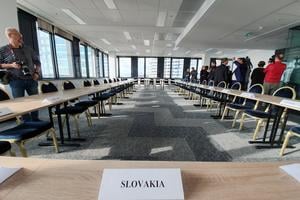EU’s new agency, the European Labour Authority, officially moved to its Bratislava premises in late 2021, after multiple Covid waves had swept across the EU.
This move, as well as the war in Ukraine, resulted in a number of challenges to the EU’s labour market, as well as new tasks for the European Labour Authority (ELA). The Slovak Spectator spoke about them with its executive director, COSMIN BOIANGIU.
Cosmin Boiangiu
is the executive director of the European Labour Authority. He is a Romanian career diplomat with expertise in EU affairs and multilateral diplomacy, security and strategic policies, development, NATO and the UN. He represented Romania at the UN and NATO. In 2016-2020 he served as deputy permanent representative of Romania to the EU and representative to the Committee of Permanent Representatives I. Prior to that, he served four years as Romania’s ambassador to Slovenia. He is a Knight of the National Order of Faithful Service (2019) for distinguished contribution to the success of Romania’s Presidency of the EU Council.
On the day the ELA premises opened in Bratislava in November 2021, you said that there were plenty of opportunities and challenges lying ahead. Could you specify to someone who is not familiar with the ELA’s role what these are, and which have you already addressed?
At that time, I had referred to opportunities and challenges for the ELA as a newly established organisation. Our mandate is very important but also very generous. It revolves around labour mobility in Europe. Our role is to make it better, smoother, and to allow people and companies to fully benefit from their status as EU citizens.
I referred to freedom of movement, of people and companies, or the ability to live, work or do business in any country of their choice, which is one of the main freedoms of the European single market. The ELA was created to enable people and companies to fully benefit from this freedom, which is fundamental for the EU.
Our role is to facilitate labour mobility, to support accessible, informed and attractive mobility, clear and user-friendly information on one side for companies, the rules they need to respect, how they can benefit from the workforce of another country and compliance with rules in place. For citizens: to advise them about their rights, on how to avoid discrimination in another country, how to have equal conditions with locals and how to find and apply for relevant jobs elsewhere in Europe.
Mobility is now increasing constantly despite some setbacks, at a slower pace because of the pandemic, and that’s why I say there is a lot of work for the ELA to be done in the coming years.


 Cosmin Boiangiu, executive director of the European Labour Authority (source: Courtesy of the European Labour Authority)
Cosmin Boiangiu, executive director of the European Labour Authority (source: Courtesy of the European Labour Authority)


